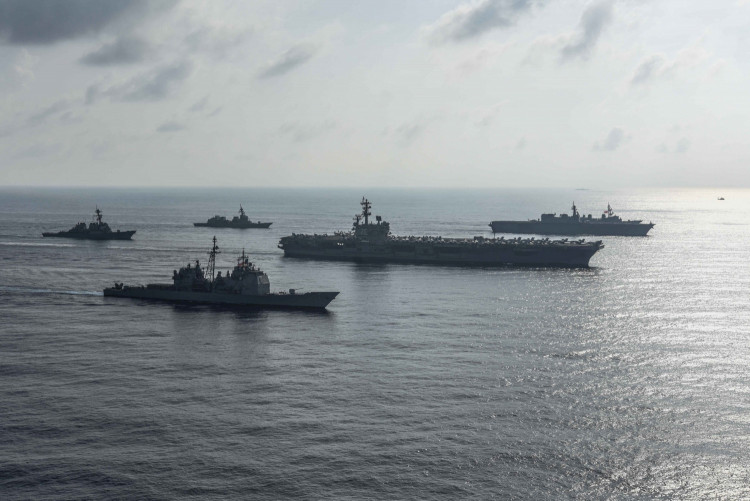Chinese military experts warn the U.S. Navy's new strategy emphasizing the likelihood of conflict against China "will intensify confrontation between Chinese and U.S. sea and air forces and might spark a conflict or even a regional war."
The dire outcome was among the conclusions drawn in a lengthy analysis of the U.S. Navy's "Advantage at Sea: Prevailing with Integrated All-Domain Naval Power" strategy by Chinese military pundits Shi Xiaoqin and Liu Xiaobo.
The new maritime strategy, which directly identifies China as America's main maritime opponent, was issued by the U.S. Navy, the U.S. Marine Corps, and the U.S. Coast Guard in December 2020. It says the maritime competition between China and the U.S. is global in scope.
Writing jointly, Shi and Liu contend the new U.S. tri-service strategy aims to weaken the advantages currently enjoyed by the People's Liberation Army Navy (PLAN) in total ship numbers as it fights to command the sea against the more capable and more powerful U.S. Navy.
They said the strategy means all of America's maritime forces "must now shift to great power competition with China and Russia, fight for command of the sea, and gain the advantage."
The new U.S. emphasis on the battle is due to an acknowledgement the U.S. Navy "no longer has command of the global commons" and can freely assert its will at will. The new strategy also finally regards as obsolete the strategic guidance that forward presence by the U.S. Navy can shape regional security and prevent conflict. The ascent of the PLAN and continuing Chinese belligerence have proven this point.
The Chinese analysis said the aim of the new strategy is that the U.S. Navy, the Marines, and the Coast Guard will come together over the next 10 years "to shape a maritime balance of power favorable to the U.S. in order to offset China's advantages."
What this means is the U.S. Navy will again emphasize great power maritime competition and not cooperation and see the need to fight for command of the sea as inevitable.
The new strategy also proposes the U.S. focus more on freedom of navigation operations (FONOPS), control of maritime chokepoints, fighting for command of the sea, and strengthening alliances.
It confirms a change in America's strategic viewpoint from one of "liberal interventionism" to "principled realism." The former, which guided the Obama administration, argue preventing war and winning war is equally important.
Under Obama, the U.S. believed it could use means other than war, including deterrence, ocean management, law enforcement, patrols, and low-intensity operations, to safeguard the international order.
On the other hand, principled realism emphasizes seizing the advantage and using traditional military power to safeguard the international order.
In the past, the U.S. believed it could achieve cooperation at sea with China. This is no longer the case given China's illegal claims in the South and the East China Sea and its actions against India in the Himalayas.
The Chinese analysis also hews closely to views held new U.S. Secretary of Defense Lloyd Austin, who told the Senate Armed Services Committee last month China is the most dangerous strategic threat facing the United States.
Austin said his focus as defense secretary would be on the danger posed by China, which he calls the "pacing threat" confronting the U.S.
"Clearly, the strategy will be arrayed against the threat and China presents the most significant threat going forward because China is ascending," said Austin.
"Russia is also a threat, but it's in decline. It can still do a great deal of damage, as we've seen here in recent days. And it's a country that we have to maintain some degree of focus on, but China is the pacing threat."
Austin told the senators the U.S. military maintains a qualitative edge over the People's Liberation Army (PLA), the armed forces of the Communist Party of China. That advantage, however, is diminishing and must be remedied.
"We'll have to have capabilities that allow us to hold -- to present a credible threat, a credible deterrent, excuse me -- to China in the future," Austin pointed out.





